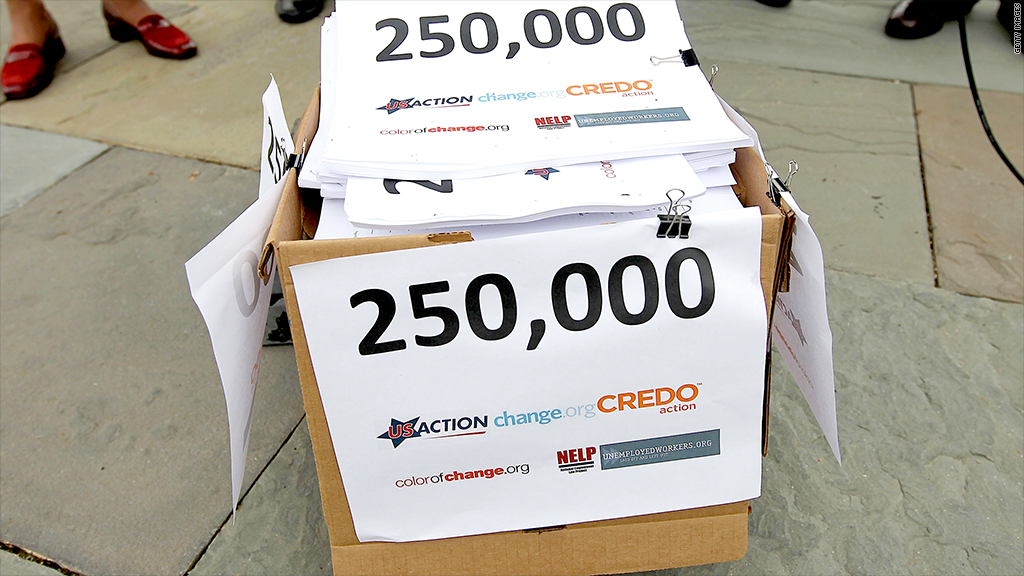
The nation's wireless companies have been largely silent following revelations that the government is collecting phone records potentially covering millions of Americans from industry giant Verizon. One exception: CREDO Mobile. which bills itself as "America's only progressive phone company."
CREDO doesn't have nearly the clout of its larger rivals, boasting only about 125,000 customers. Compare that to Verizon's 98.9 million retail connections and Sprint's 53.9 million.
But CREDO has found a niche among left-leaning Americans by tying its business to a robust activism arm known as CREDO Action, increasing its customer base 25% in the past two years.
CREDO -- which began as a credit-card business in 1985 and launched mobile-phone service in 2000 -- supports causes including gay marriage, environmental protection and campaign-finance reform. The company is also a big proponent of civil liberties, and after news of the phone-record dragnet, it was quick to criticize what CEO Michael Kieschnick called a "vacuum-cleaner approach to our private information."
"What possible threat can justify the FBI indiscriminately tracking the phone calls of Americans?" Kieschnick said in a statement Thursday. "As the CEO of a mobile phone company, I'm deeply disturbed by the Obama administration's growing record of executive power grabs at the expense of constitutionally guaranteed civil liberties."
The story was first reported by The Guardian, which published a top-secret Foreign Intelligence Surveillance Act (FISA) court order requiring Verizon to turn over records on a daily basis.
Related: Apps claim they can keep phone records secure
Verizon's response to the scandal has been muted.
The company declined to comment Thursday. In a memo to employees, Vice President Randy Milch said Verizon was forbidden from revealing the existence of a court order like the one reported by The Guardian but was compelled to respond to such directives. Milch added that the company did not disclose the content of communications "or the name, address, or financial information of a subscriber or customer."
"Verizon (VZ) continually takes steps to safeguard its customers' privacy," Milch wrote. "Nevertheless, the law authorizes the federal courts to order a company to provide information in certain circumstances, and if Verizon were to receive such an order, we would be required to comply."
It's not clear exactly how many customers the surveillance covers, or whether other companies are subject to similar requirements. T-Mobile (TMUS), Sprint (S) and AT&T (T) all declined to comment.
A senior official in the Obama administration defended the notion of such surveillance Thursday, without acknowledging the existence of the court order.
"Information of the sort described in the Guardian article has been a critical tool in protecting the nation from terrorist threats to the United States," the official said in a statement.
While CREDO has loudly criticized the government's surveillance effort, it's required to comply with such court orders just like the rest of its competitors.
"[W]e wish we could guarantee our customers that we could protect them from government wiretapping and other invasions of their privacy, but only Congress or the Courts can protect Americans from this kind of executive overreach," Kieschnick said in an email. Under current law, he added, "we could not comment in any way on whether we have received any FISA court orders or national security letters, and our lack of comment should not be interpreted as either confirmation or denial."
Kieschnick pledged that in the face of requests by the government for customer data, CREDO "would use every means at our disposal, from litigation to grass-roots mobilization," to resist "improper" access. A portion of the company's revenue goes to support privacy advocates including the American Civil Liberties Union and the Electronic Frontier Foundation.
While it's still early to judge, the phone-record scandal may end up being good for business. CREDO spokeswoman Sarah Lane said in an email Thursday that the company's sales agents had reported "an increase today in calls from people wanting to know more, citing the FBI story."
"[O]f course we do not promise them that we can protect them from all surveillance," she added.
CNN Wires staff contributed to this report.

